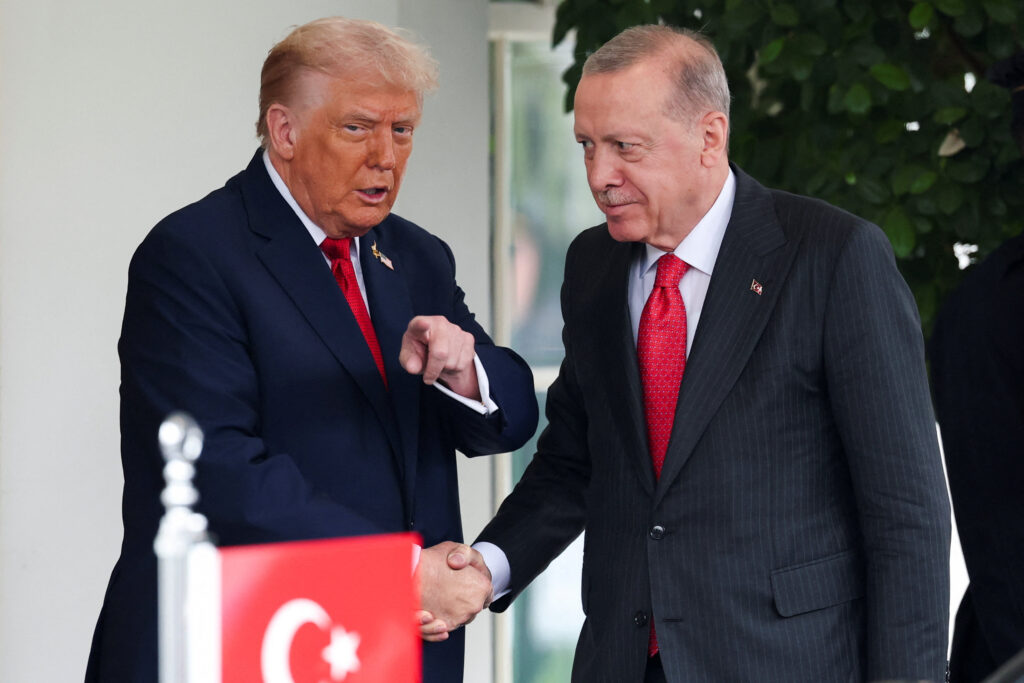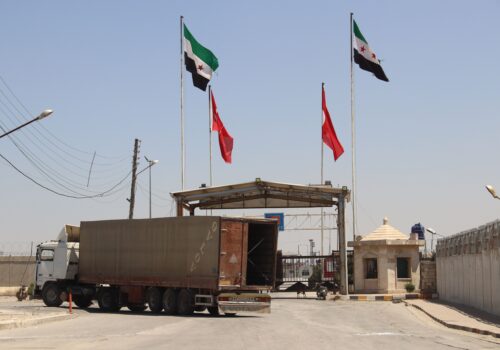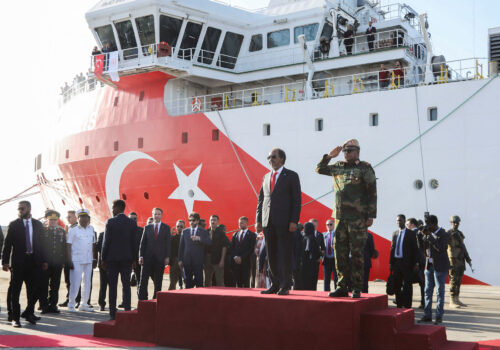Turkish President Recep Tayyip Erdoğan met with US President Donald Trump on Thursday, marking the Turkish leader’s first White House visit in six years. The meeting comes as several issues in the US-Turkish bilateral relationship remain unresolved, such as long-stalled talks over US sales of F-35 fighter jets to Ankara, US sanctions on Turkey, and Trump’s demand that NATO countries, including Turkey, stop buying Russian oil.
Was progress made on any of these issues? And how might the Trump-Erdoğan meeting impact broader US-Turkish cooperation on trade, energy, and policy toward the Middle East? Find our experts’ takeaways from Erdoğan’s visit below.
Click to jump to an expert analysis:
Rich Outzen: Three reasons the Trump-Erdoğan meeting was a success
Yevgeniya Gaber: Cooperation on Ukraine could help bolster US-Turkish ties
Grady Wilson: Trump gives the nod to Erdoğan’s regional influence
Pınar Dost: Washington and Ankara are unlocking their vast energy trade potential
Ömer Özkizilcik: Turkey is the kingmaker Trump wants to work with in Syria
Three reasons the Trump-Erdoğan meeting was a success
The meeting between Trump and Erdoğan was a success on three levels. First, the fact that the trip occurred at all is significant, as it ended a six-year period of arms-length distance between the countries’ leaders, despite their shared interests and strategic matters requiring top-level coordination. This marks a positive if partial shift of tone in the bilateral relationship. That should play out in tighter cooperation on defense, energy, trade, and regional matters for the rest of the current US administration’s term.
Second, the optics of the joint press conference were overwhelmingly positive. The two men praised one another, avoided embarrassment, and ticked off a list of areas of shared concern and general policy overlap: Syria, Ukraine, ending the war in Gaza, and resolving the F-35 and US sanctions issues to resume broader defense industrial cooperation.
Third, after the closed-door session, we have hints that solid progress was achieved in several areas. US Ambassador to Turkey Tom Barrack expressed optimism that the reintegration of the Syrian Democratic Forces into the Syrian state security structure was moving forward and could be substantially achieved by the end of the year. And an announcement is expected after the meeting that could provide a roadmap for resolving the disputes over F-35s and US sanctions. In terms of concrete agreements, it appears that two major energy agreements—one for twenty-year liquefied natural gas (LNG) purchases valued at $43 billion and a civilian nuclear deal involving small modular reactors—were formalized during the meeting. Other commercial deals may be announced in formal readouts of the meeting.
The United States’ asks of Erdoğan likely included the reopening of the Orthodox monastery at Heybeli Island—not a very heavy lift and one that Erdoğan has signaled receptivity to—and a suspension of Turkish purchases of Russian oil, which is a much bigger ask.
Perhaps the broadest takeaway from the meeting is the reflection at all three levels—the occurrence of the meeting itself, optics and atmospherics, and discussion of regional issues—of growing convergence between the two presidents’ foreign policies. If the F-35 and sanctions issue gets a concrete resolution rather than a roadmap, that may become the bigger story. But for now, the feel-good nature of the visit benefits both leaders and both countries’ diplomatic positioning. Not all observers in Ankara or Washington will be pleased with this closer alignment, but the decision makers have weighed the merits and are moving forward.
—Rich Outzen is a geopolitical consultant and nonresident senior fellow at the Atlantic Council Turkey Program with thirty-two years of government service both in uniform and as a civilian.
Cooperation on Ukraine could help bolster US-Turkish ties
The White House meeting between Trump and Erdoğan opens a rare window of opportunity for US-Turkish relations—with Ukraine at the center. With peace talks stalled and Moscow refusing to constructively engage with US or Turkish mediation efforts, Washington and Ankara share overlapping interests in deterring further Russian aggression in the Black Sea and preventing Russia from consolidating additional gains in Ukraine.
This common agenda requires joint effort. A breakthrough would be possible if Ankara decides to resolve the lingering issue over Turkey’s purchases of the Russian S-400 missile system, paving the way for Turkey’s return to the US F-35 program. Such a step would be a win-win: It would reinforce NATO’s deterrence and defense posture in the region while restoring Turkey’s access to advanced allied capabilities. If paired with a (partial) lifting of the US Countering America’s Adversaries Through Sanctions Act (CAATSA) sanctions, the move could also unlock deeper defense-industrial cooperation between Ankara and Washington, boosting NATO’s European pillar.
Energy is another crucial front. Trump made clear that Turkey should reduce its purchases of Russian oil and gas. Even a gradual shift would lessen Ankara’s dependence on Moscow while cutting into the Kremlin’s main source of wartime revenue. This, combined with the newly signed US-Turkey agreement on nuclear cooperation—including potential deployment of small modular reactors—signals an alternative to Russia’s dominant role in Turkey’s energy sector through the Akkuyu nuclear plant and future projects.
Taken together, these developments point to a rare win-win-win: for the United States, for Turkey, and for Ukraine. If Ankara seizes this moment, it can help Ukraine push back against Russia, reinforce Black Sea stability, and reinvigorate its strategic partnership with Washington and NATO allies. The window is open—and this opportunity should not be wasted.
—Yevgeniya Gaber is a nonresident senior fellow at the Atlantic Council Turkey Program.
Trump gives the nod to Erdoğan’s regional influence
In the joint press conference between the two leaders, Trump did most of the talking. In responses to questions from reporters, Trump was light on details and noncommittal regarding the tricky issues Turkey and the United States have been working on for years, from defense systems to Syria to Gaza. But Trump was effusive in his respect for the Turkish leader, and he recognized Turkey’s increasing regional influence. Trump’s remarks underscore those made by US Special Envoy to the Middle East Steve Witkoff in New York earlier this week. Witkoff noted that he regularly consults with key Turkish policymakers, including Foreign Minister Hakan Fidan and intelligence chief Ibrahim Kalin, on issues such as Caspian Sea and Black Sea security.
Given the current geopolitical landscape, there is good reason to believe this is more than just talk. Turkey has strengthened its influence and position in all the regions that it has intervened in directly in recent years, most dramatically in Syria, but also in Libya and the South Caucasus. And as Trump noted in the press conference, few other heads of state can claim the respect of both Russian President Vladimir Putin and Ukrainian President Volodymyr Zelenskyy.
The details of where and how Turkey and the United States will work together going forward, as well as what US defense technology will make its way to Turkey, still need to be hashed out behind closed doors and executed over months and years. Nevertheless, today’s meeting should generate optimism for the future of US-Turkey relations, as Trump and Erdoğan demonstrated a common understanding that acting in coordination is to the benefit of both NATO allies.
—Grady Wilson is a deputy director at the Atlantic Council Turkey Program, where he manages digital communications, coordinates events, and supports the program’s programming on US-Turkey bilateral relations.
Washington and Ankara are unlocking their vast energy trade potential
Thanks to business-oriented presidents on both sides of the Atlantic, a new working model of cooperation between the United States and Turkey is emerging. A significant aspect of this relationship is the growing potential for trade and energy cooperation, both bilaterally and in regions that have long been battlegrounds for military and political struggles.
Yesterday, BOTAŞ, Mercuria, and Woodside Energy signed a major deal to import US LNG—approximately 70 billion cubic meters of natural gas over twenty years. This is significant, as it will help Turkey further diversify its natural gas sources at a time when Trump is taking a firmer stance on supporting Ukraine against Russia and the need to halt energy trade with Moscow.
It is important to view these agreements in parallel with other deals signed a few months ago between leading Turkish, US, and Qatari companies to invest in the construction of natural gas and solar power plants in Syria. Additionally, these countries’ agreement to remove obstacles to oil exports from the Kurdistan Regional Government of Iraq to Turkey’s Ceyhan port after a two-year hiatus are about to bear fruit. The resumption of oil exports will benefit Iraq, Turkey, and US companies. There may also be further cooperation in Libya, where both Turkish and US companies signed deals with the country’s National Oil Company this summer. This growing cooperation will contribute to the welfare and stability of these regions, where Turkey is also present militarily and contributes to state and military capacity-building.
—Pınar Dost is a nonresident fellow at Atlantic Council Turkey Program and a historian of international relations. She is also the former deputy director of Atlantic Council Turkey Program. She is an associated researcher with the French Institute for Anatolian Studies.
Turkey is the kingmaker Trump wants to work with in Syria
The meeting in the White House was dominated by the positive personal relationship between Erdoğan and Trump. But even beyond their personal rapport, Erdoğan and Trump share a convergence of interests in the Middle East. Turkey’s vision of regional responsibility aligns with the Trump administration’s strategy of delegating burdens to local allies. This is most evident in Syria, where Trump lifted sanctions to allow regional partners to contribute to reconstruction. For Trump, Turkey is the kingmaker he wants to work with in Syria. As a result of this thinking, large-scale Turkish-American-Qatari investment projects in Syria are already underway.
Erdoğan and Trump are both leaders known for bypassing diplomatic conventions in favor of personal dealmaking. In this manner, Erdoğan’s visit to the White House has not only improved US-Turkish relations but also apparently produced positive momentum in Syria.
In Syria, Erdoğan seeks US backing for a security mechanism between Israel and Syria to mitigate the destabilizing impact of Israeli strikes. From Ankara’s perspective, Israeli actions not only undermine Syrian stability but also weaken Damascus in its negotiations with the Syrian Democratic Forces (SDF). The SDF is dominated by the People’s Protection Units (YPG), the Syrian branch of the Kurdistan Workers’ Party (PKK) terrorist group that poses a direct threat to Turkey’s national security. Building on the recent call by imprisoned PKK leader Abdullah Öcalan for the group to lay down arms, Ankara favors a political settlement in northeastern Syria that would integrate the SDF into the Syrian state.
Judging by the statement by Barrack—who also serves as the special envoy for Syria— Erdoğan and Trump agree on the need for the SDF to implement the March 10 agreement with Damascus incorporating its forces into the government. In some way, today’s meeting between Erdoğan and Trump empowered Syrian President Ahmed al-Sharaa’s hand in negotiations with the SDF.
—Ömer Özkizilcik is a nonresident fellow for the Syria Project in the Atlantic Council’s Middle East Programs. He is an Ankara-based analyst of Turkish foreign policy, counterterrorism, and military affairs.
Further reading
Wed, Sep 24, 2025
Is a new era of Turkey-Syria economic engagement on the horizon?
MENASource By
The convergence of Turkey's and the Gulf's economic strategies in Syria presents an opportunity for Washington.
Mon, Aug 11, 2025
How Turkey’s strategic ambiguity became an advantage in a multipolar world
TURKEYSource By
In a unpredictable international system, Turkey’s ability to maintain ties across divides and rivalries has become its greatest asset.
Wed, Sep 10, 2025
To counter Chinese and Russian influence in Africa, Turkey could be a decisive ally for the US and Europe
AfricaSource By Rama Yade, Defne Arslan
As Turkey continues to develop closer ties to African nations, the United States and Europe should work with Turkey as a partner in its efforts to gain soft power throughout the continent.
Image: US President Donald Trump welcomes Turkey's President Recep Tayyip Erdogan at the White House in Washington, D.C., U.S., September 25, 2025. REUTERS/Jonathan Ernst.




